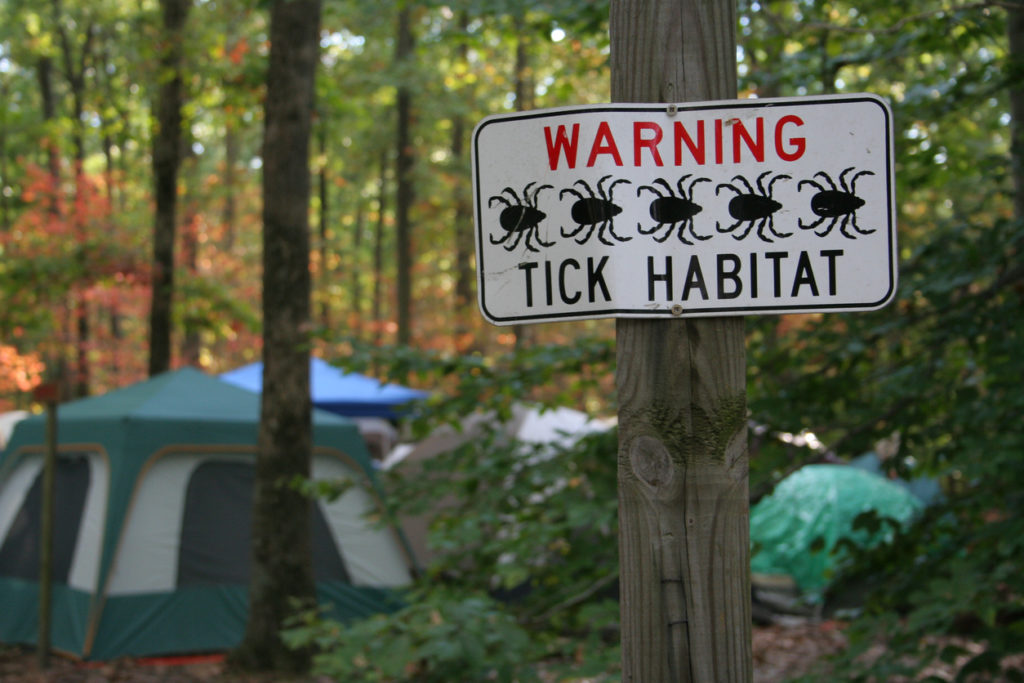Here’s a picture for you. I’m lying on my bed, starkers. My wife, who’s fully clothed, crouches over me. In her right hand she holds a pair of tweezers. She’s wearing her glasses and her most serious expression; part hunter, part librarian. “There’s one,” she says. “Evil little bastard.” She goes in for the kill, diving with the tweezers.
I yelp, like someone trod on my tail. “No darling, I think that’s part of me.”
“My mistake,” she mutters. “It’s a tiny mole.”
She goes quiet again. There’s something quite touching about her intense concentration. She moves higher up the back of my legs. As things get intimate I hear her sigh; “I can’t believe I’m doing this.”
There are certain favours you can only ask of someone who knows you really, really well and checking for ticks after a run in the woods is definitely one of them. Those little blighters thrive on human embarrassment. Of the three that my wife removed that day, one had made its way into a place where the sun don’t shine. I would never have found it on my own and there’s only one person in the world I can ask to go poking around in there…
I had the late Chris Brasher to thank for my parasitic passengers. Two days previously I’d taken part in an annual run to celebrate the life of the Olympic gold medallist and co-founder of the London Marathon. During his career as an athlete, Brasher would train in Richmond Park and one of his favourite runs was a nine miler, linking twenty of the park’s ponds. Every year, his old club (the Ranelagh Harriers) runs the route in his honour.
It was my first attempt at the 20 Ponds Run and I was glad our group was being led by someone who’d completed it several times before. He took us twisting and turning through the huge park’s less visited areas. There was a fair amount of climbing but we were rewarded with some swift single-track running that previously I hadn’t known existed. Of the twenty ponds, many were small, some had dried up completely and, with the exception of the larger ones, all were surprisingly difficult to find. Richmond Park was in full mid-summer bloom and, off the beaten track, the plant life was threatening to take over. Some of the smaller paths had disappeared into this verdant carpet not to be seen again until autumn. There was plenty of bracken-bashing as our leader attempted to take the most direct line between the ponds. Sweeping through the chest-high fronds was great fun but all the time I was thinking, “This is prime tick territory.”
Okay, so they’re blood-sucking parasites, but on their own ticks are nothing to worry about. They’re tiny and their bite is completely painless. It’s the disease-carrying bacteria found in their mouth parts that give us runners cause for concern. A tick will bury itself headfirst in your skin and if it can remain attached for up to 48 hours it may well transfer this bacteria into the body. This in turn can cause Lyme disease, a nasty little infection which can have some very unpleasant and long-lasting symptoms, if left untreated. And there lies the problem. Often people don’t seek treatment because they’re unaware they’ve been exposed to Lyme disease as they don’t realise they’ve been bitten by a tick. There are 65,000 recorded cases in Europe every year but doctors fear many more go undiagnosed. The good news is that, detected early, the disease can easily be treated with antibiotics. Look for a red ring appearing around bites. Later symptoms can feel like ‘flu so even if you haven’t seen a tick on your body, if you’re feeling rough it may be worth mentioning to your doctor that you’ve been running in tick country.
A tick’s modus operandi is to hang around on foliage (bracken is ideal) and wait to get swept onto a passing mammal. Deer and dogs are its preferred source of food but a bracken-bashing runner will do just as well. The hairier the better too, as far as the tick is concerned. It will often use your body hair to climb into a dark crevice where it hopes to be able to feed for several days unnoticed and undisturbed. Hence the need for a thorough check whenever you’ve been running in a tick-infested area (they like woods, heathland and moorland) during their active season (spring through to early autumn). Hence the need also to suspend your embarrassment and ask a really good pal to have a really good look in those hard to reach places.







